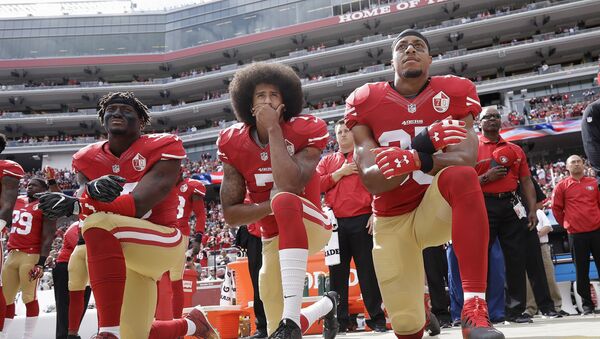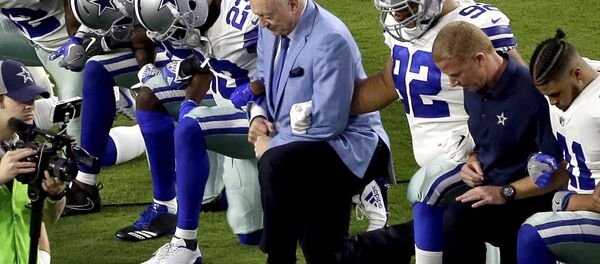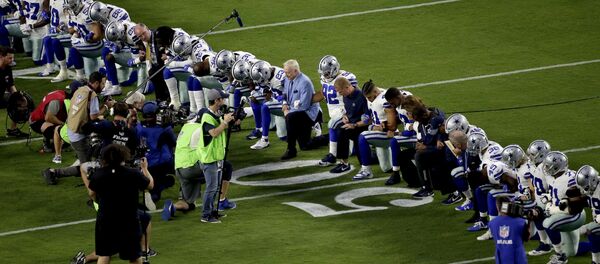During a discussion about how to handle the growing controversy about professional football players taking a knee during the playing of the national anthem before games, Houston Texan's owner Bob McNair commented that "we can't have the inmates running the prison," fanning the already high flames still further.
McNair's comment was not well received. Another NFL executive and former player, Troy Vincent, fired back against McNair and Dallas Cowboys owner Jerry Jones.
Vincent said that in all his years of playing in the NFL, although he had been called every name in the book — including racial slurs — he never felt like an "inmate," according to an ESPN The Magazine article about the meeting.
McNair, who was a multimillion-dollar supporter of Donald Trump's successful presidential campaign according to The Daily Beast, unsurprisingly sided with the US president, joining a growing chorus of hardline NFL leaders who see the protest movement, and the attention it has drawn to the league, as a problem to be overcome with vinegar instead of honey.
Despite his strong opposition, McNair extended the olive branch at least to Vincent, saying that he felt horrible and that his words weren't meant to be taken literally, which Vincent appreciated, according to ESPN.
Friday morning, the Texans released a more complete statement by McNair: "I regret that I used that expression. I never meant to offend anyone and I was not referring to our players, I used a figure of speech that was never intended to be taken literally. I would never characterize our players or our league that way and I apologize to anyone who was offended by it."
The tone-deafness shown by McNair in calling NFL players "inmates" in a "prison" only emphasizes the motivation behind the players' protests. According to the Bureau of Justice Statistics, black Americans face a rate of incarceration nearly four times that of hispanic Americans and five times that of white Americans. In other words, McNair's comment about his players standing up for equality evokes exactly the inequality against which they are fighting. To the white McNair, the comparison was likely a simple turn of phrase, the details of which he scarcely gave a second thought, but it shows the deep disconnect between the NFL's leadership, its players, and their motivations, which does not bode well for reaching a mutual understanding about the protests.
‘So Much Had Been Discussed and so Little Had Been Decided'
The confidential meeting where McNair's comments were made followed a much-heralded meeting between owners, executives and players the day before, where such listening and negotiation was expected to settle at least some of the outstanding issues surrounding the protests. As ESPN noted, the owners' goal for the meeting was to ‘stop Trump from attacking our business. Find a way to persuade players to stop kneeling. Get the focus back to football."
The executives were primarily concerned with money. A recent poll by Morning Consult showed the NFL's net favorability had dropped to 11 percent from a high of 56 percent in May. Further, league executives were worried that upcoming events, such as Veterans Day and the NFL's Salute to Service, might spark anti-NFL protests by pro-military groups who might perceive both player protests and league uncertainty as anti-patriotic.
Nonetheless, the owners elected to give players' representatives — but notably not Kaepernick — at least a fair hearing. Some of the most vocally anti-kneeling owners, like Washington owner Dan Snyder, were notably absent from the roundtable (or rather football-table, as the meeting room at NFL headquarters is shaped like a football) talks, an exclusion made on purpose by owner Roger Goodell.
The players' message was that "this wasn't an ‘anthem protest' but rather an ‘inequality in America' protest," according to ESPN. Further, they felt that "fans needed to hear from owners that players who knelt or raised fists were good men who loved their country," and not just hear messages of support inside the locker rooms.
Day one's roundtable meeting failed to produce a universal understanding, and the meeting on the second day between owners and executives had a noticeable shift in tone, according to ESPN. Behind closed doors, Jones and Snyder went on the offensive, supporting a mandatory standing rule that would ban kneeling — something previously threatened by many owners. At one point, Synder mumbled aloud: "See, Jones gets it — 96 percent of Americans are for guys standing," which ESPN notes is a greatly exaggerated statistic.
It was then that McNair made his infamous remark, stunning many people.
Afterward, New England Patriots owner Robert Kraft, who is personal friends with Trump, tried to walk back the conversation from the hard line being advocated by Jones, and many others present followed his lead. Even Vincent, however, who rebuked McNair and is personally sympathetic to the players' concerns, deeply opposes the protests.
Although the meetings in mid-October set little in stone, the message sent by the NFL's leadership was clear: the owners are in charge and the players are not. In that, McNair's comment was an embarrassing expose and not an erroneous eruption.




